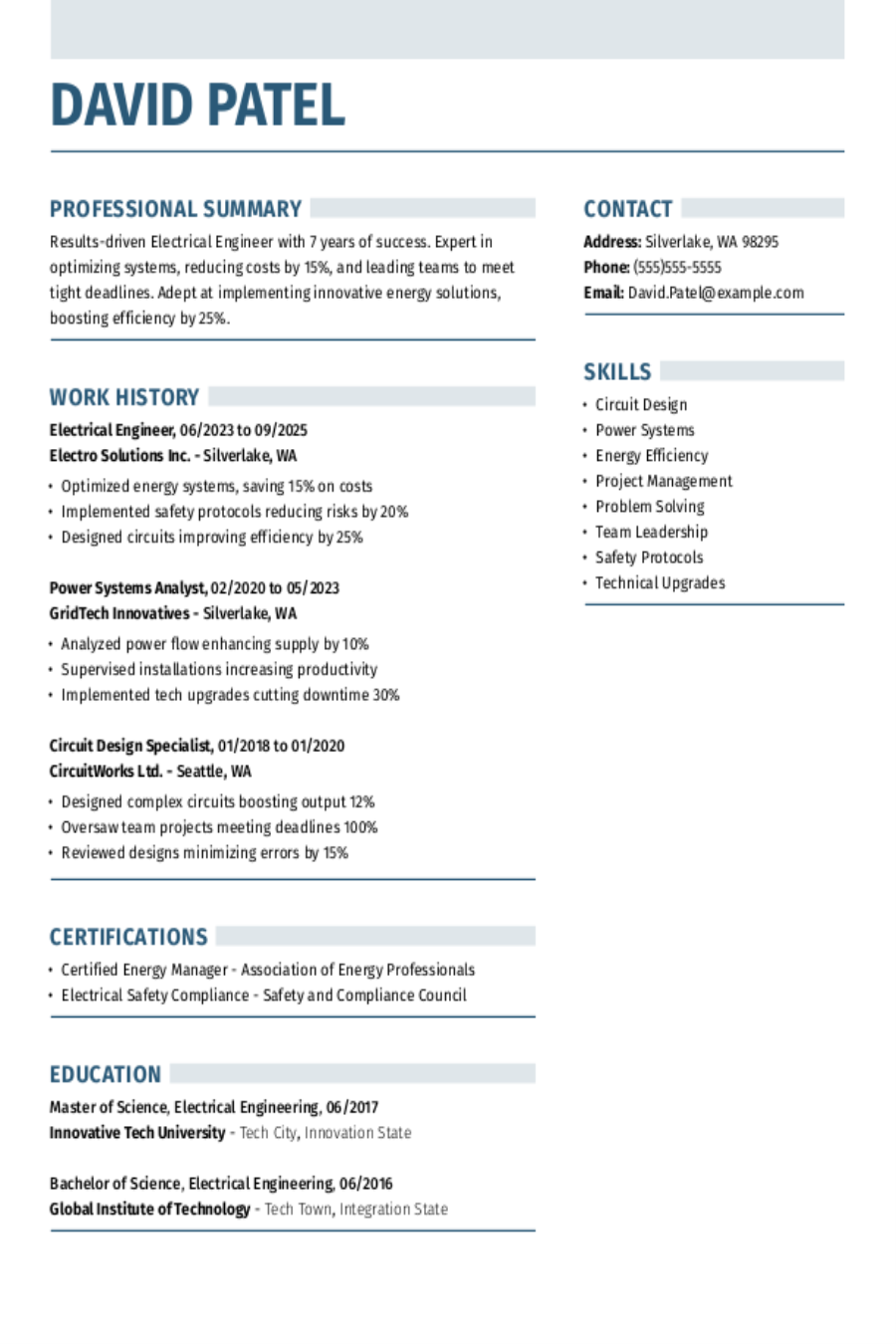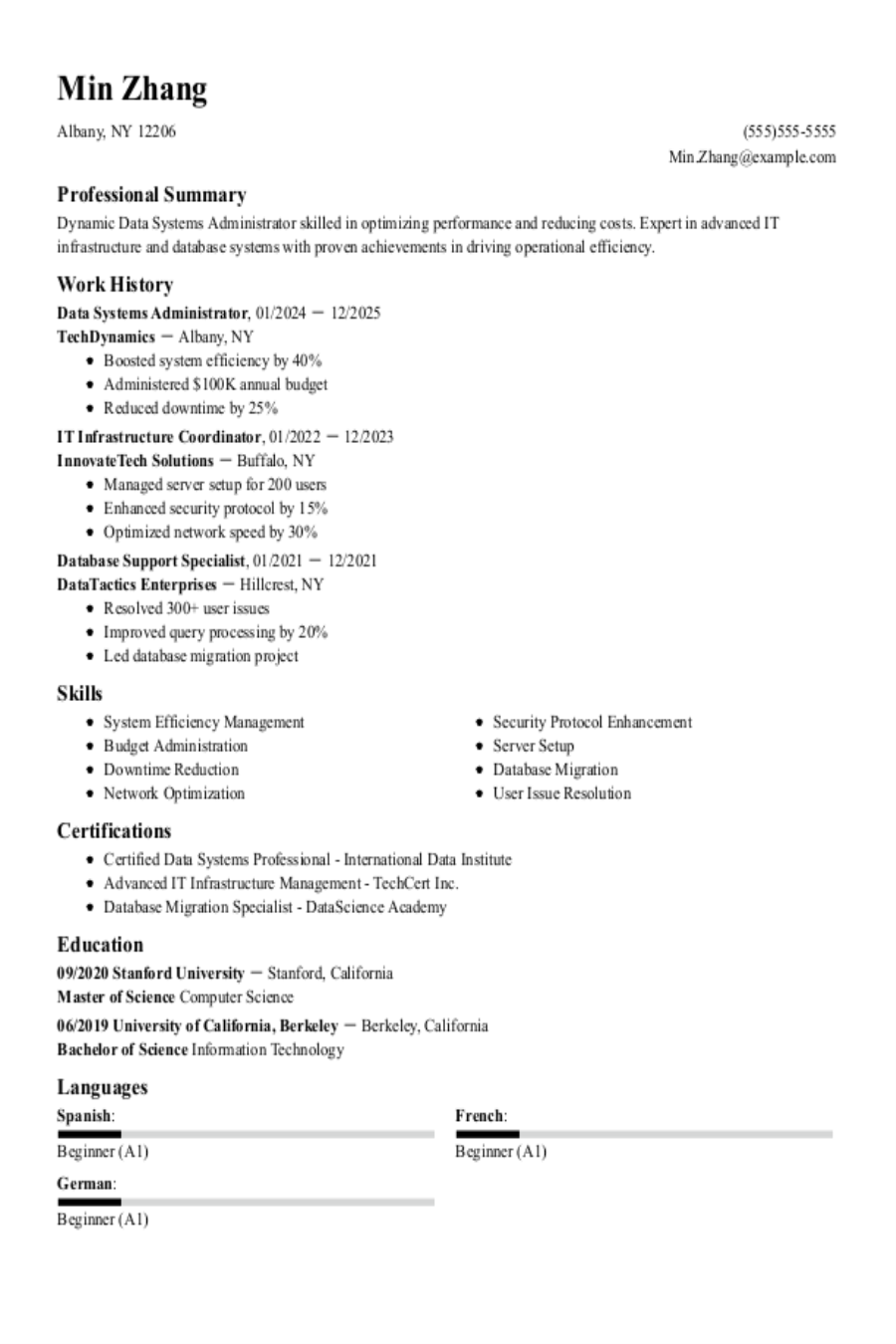When you're on the hunt for the perfect job, the quality of your resume is absolutely crucial. The key to getting the job you want is to submit a resume that makes it simple for a hiring manager to see that you are the right person for the role. Your skills are an important factor, but for many employers, it's all about work experience.
Resumes are designed to guide potential employers through your career journey. To convince the hiring manager that you've got what it takes, you need to learn how to write an employment history that showcases your track record of achievement. Here, we show you how to do just that.
On this page, you'll discover:
- How to list work history on a resume
- Six examples that demonstrate how to write your resume job descriptions
- How to choose the best resume format for your work experience level
- Four tips on how to write a resume employment history
Ready to start building your resume? Try our AI Resume Builder. This tool provides ATS-friendly templates, expert guidance, and targeted content to help you make a stunning resume in minutes.
How to List Work History on a Resume
To list your job history on a resume, simply follow these three steps.
Step #1
List your jobs in reverse-chronological order, starting with your most recent or current position.
The best resumes lead the reader through your career history in detail. You can try any resume format that fits your career level, but the chronological format works best for most candidates.
Step #2
Include your exact job title along with the name and location of the company.
Employers need to be able to verify your work experience. List your roles along with the company's details and your dates of employment.
Step #3
Highlight your most important job duties and notable accomplishments.
Use your resume's job history to highlight your key skills in action by listing your key achievements and outlining your responsibilities in past roles using active language and metrics.
Consistency is key. When you are done writing your resume, make sure to double-check that each entry is uniform.
Customize and download a resume template today to enhance your job search.
How to Write a Resume Employment History: 4 Tips
To make your resume's work experience section really stand out, consider employing the following tips:
Feature action verbs
Using interesting language is a smart way to get the attention of a recruiter or hiring manager. Remember, they are often reviewing dozens—if not hundreds—of resumes for every role.
To make your work experience section pop, avoid dull language when describing your work responsibilities. This means skipping generic phrases like "Responsible for answering phones" and opting instead for action words like "Managed a busy phone system and fielded up to 15 calls an hour."
Use data and metrics
Like in the example above, using numbers in your work experience section is an eye-catching way to show—not tell—employers about the impact of your work. Listing numbers associated with your accomplishments gives a concrete example of what you'll bring to the table if hired.
Consider data surrounding your day-to-day tasks—like the number of guests greeted or how many sales calls you place in a day—in addition to metrics related to professional wins you are proud of.
Add unique skills
While studying the job ad is critical to getting the right skills and experience into your work experience section, don't stop there.
If you have transferable skills that are not listed in the job ad, list those as well. And, if you have unique skills, like fluency in multiple languages, be sure to mention them.
Mimic the language of the job posting
Use the same language on your resume as is used in the job post. Since your resume is likely to be read by an ATS before a human ever sees it, the way you phrase things is key.
An ATS doesn't understand nuance, so if a job ad asked for "proficiency with Microsoft Word," it won't recognize that "strong Word skills" means the same thing. Use targeted keywords to help your resume both pass through ATS screening and demonstrate to the employer how well you fit the role.
Wondering if your resume will make it into human hands? Try our free ATS Resume Checker. We'll scan your resume for formatting and content and provide an ATS score with tips to help you improve it.
How to Write Job History: 6 Examples
To write a resume that helps you get noticed, focus on creating a work history section that clearly shows employers that you have the skills and experience they seek. To do this, customize the bullet points in your job history section for each role you apply to so that you can position yourself as the perfect candidate for the specific role.
Customizing your resume to each job is essential because many employers today use applicant tracking systems (ATS) to screen out unqualified candidates based on keywords matching the professional skills and experience they're seeking.
Tailoring your resume work experience to the specific role is a critical but simple way to get your resume through an ATS and into the hands of a potential employer. To tailor your resume, study the job description and tweak your resume to ensure it contains the qualifications they're after.
Below, you'll find examples of six job ads with a matching sample job history section for each to see how it's done.
Sample job ad for a home health aide role
A home care company that values dedication and rewards its caregivers with flexible scheduling, great benefits, consistent hours, and tons of support is seeking home health aides.
Responsibilities include:
- Establishing strong communication with clients and their families
- Providing thoughtful in-home care
- Administering medications
- Assisting with personal care needs
- Light cleaning and cooking
All caregivers must be fully vaccinated and speak fluent English.
Example job history section for this role
Home Health Aide
BrightCare Home Services, Norfolk, VA
03/2021 – Present
- Build strong, trusting relationships with clients and their families to ensure compassionate, personalized care.
- Provide thoughtful in-home support to over 45 clients, assisting with personal hygiene, mobility, and daily living activities.
- Administer prescribed medications safely and document all care provided.
- Maintain a clean, comfortable home environment through light housekeeping and meal preparation.
- Ensure compliance with health protocols and maintain vaccination requirements to safeguard client well-being.
Sample job ad for a customer service representative role
Seeking a remote customer service representative in the medical field.
In this role, you will be responsible for:
- Answering calls from patients and medical staff
- Assisting with questions in a prompt and courteous manner
Requirements include:
- Strong problem-solving skills
- Ability to work independently
- Excellent phone and communication skills
Experience using Slack and Zoom for internal communications is preferred.
Example job history entry for this role
Customer Service Representative – Medical Support
HealthConnect Services, Remote
06/2022 – Present
- Answer 50-70 incoming calls daily from patients and medical professionals, providing clear, empathetic assistance on scheduling, billing, and care coordination.
- Resolve patient inquiries with an average first-call resolution rate of 92%, applying strong problem-solving skills and maintaining a calm, professional demeanor.
- Collaborate with internal teams via Slack and Zoom 15+ times per day to coordinate patient needs and ensure accurate, timely updates to care plans.
- Document all patient interactions in electronic health record systems with 100% compliance to documentation standards, supporting seamless follow-up and regulatory requirements.
Sample job ad for a senior technical writer role
The senior technical writer plans, researches, and writes detailed instructions for customers. This is a critical role that requires the following skills and experience:
- Ability to collaborate cross-functionally with a variety of teams
- Experience managing projections, schedules, and delivery dates
- Strong writing and editing skills
- The ability to make complex concepts simple and easy to understand for consumers
Example job history entry for this role
Senior Technical Writer
Innovatech Solutions, Remote
03/2019 – 07/2025
- Planned, researched, and produced detailed user guides, online help content, and quick-start materials, supporting over five major software product launches annually.
- Collaborated cross-functionally with engineering, product, UX, and customer support teams to ensure documentation aligned with feature design and user needs.
- Managed multiple documentation projects simultaneously, maintaining 100% on-time delivery across schedules and release cycles.
- Translated complex technical concepts into clear, concise instructions, which helped reduce support ticket volume by 30% through improved self-service resources.
- Edited and standardized content from subject matter experts, ensuring a consistent voice and style across all customer-facing materials.
Sample job ad for a plumber role
Seeking a plumber to join the facilities department of a local community college. Must have at least two years of plumbing experience and the ability to demonstrate a strong understanding of the craft, including:
- Knowledge of codes, regulations, and construction practices applicable to plumbing systems in commercial/institutional construction
- Ability to read, write, and perform basic arithmetic calculations
- Experience in the proper use and maintenance of hand and power tools related to plumbing
- Strong problem-solving skills
Excellent communication and customer service skills are also required for success in this role.
Example job history entry for this role
Plumber
Midtown Mechanical Services, Cityville, NY
05/2022 – 06/2025
- Installed, maintained, and repaired plumbing systems for commercial and institutional facilities, ensuring compliance with local and state plumbing codes and safety regulations.
- Utilized a wide range of hand and power tools, performing regular maintenance to keep equipment in optimal condition.
- Troubleshot complex plumbing issues, resolving problems quickly to minimize downtime for clients.
- Communicated effectively with facility managers, contractors, and building occupants, providing professional, customer-focused service.
Sample job ad for a front desk receptionist role
Seeking a front desk receptionist with one to three years of experience performing administrative tasks. Responsibilities include, but are not limited to:
- Greeting customers
- Answering busy phone lines
- Maintaining customer files
- Receiving deliveries from vendors
Must have at least a high school diploma and strong communication skills. Good organizational skills and the ability to multitask are a must. Proficiency with Microsoft Office is preferred.
Example job history entry for this role
Front Desk Receptionist
HarborPoint Dental Group, Riverside, CA
02/2023 – 03/2025
- Greeted an average of 30+ patients and visitors daily, ensuring a welcoming, professional first impression.
- Managed multiline phone systems, answering calls promptly and routing inquiries to appropriate staff.
- Organized and maintained 200+ active customer files, both electronic and paper, ensuring confidentiality and quick retrieval.
- Balanced multiple tasks in a fast-paced environment while maintaining strong communication and organizational skills.
Sample job ad for a kindergarten teacher role
Seeking a kindergarten teacher for the 2025-2026 school year. Must be experienced in curriculum design and planning, and be able to provide examples of their work.
Having a demonstrated ability to assess the accomplishments of students regularly, write evaluations, and create a plan for success is required.
Preference goes to candidates who have a proven track record of creating a classroom environment that is supportive and conducive to learning. Experience referring students to alternative services, such as speech therapists and ESL programs, is a plus.
Example job history entry for this role
Kindergarten Teacher
Sunny Meadows Elementary School, Austin, TX
08/2019 – 06/2025
- Designed and implemented age-appropriate curriculum plans, integrating literacy, math, and social-emotional learning to support diverse student needs.
- Regularly assessed student progress through observations, portfolios, and formal evaluations, developing individualized plans to promote growth.
- Created a positive, inclusive classroom environment, fostering student confidence and collaboration, resulting in a 15% increase in benchmark scores year over year.
- Collaborated with speech therapists, ESL instructors, and special education teams to ensure students received tailored support services.
- Prepared detailed progress reports and conducted parent-teacher conferences to communicate student accomplishments and strategies for continued success.
Choose the Best Resume Format for Your Experience Level
To make the most of your work experience section, you'll need to choose the right resume format for your career profile.
While all resume formats contain five core sections—a header, a professional summary or resume objective, employment history, a skills section, and an education section—each one arranges the sections of your resume differently to highlight a different aspect of your background and experience.
Typically, job seekers choose their resume format based on their level of work experience. Below, we outline each of the three formats to help you choose the one that's right for you.
Chronological
The chronological resume format works best for applicants who have several years of relevant work experience. It lists your work experience in reverse-chronological order so that your on-the-job achievements can shine. This is the right format for you if:
- You have a steady work history with no major gaps.
- You have a stellar career progression.
- You have had more than one job in your field.
Functional
The functional resume format works well for recent graduates or those just entering the workforce. It emphasizes skills instead of work history. This is the best format to use if you need to put together a resume with no work experience. This is the right format for you if:
- You are learning how to write a resume with no job history.
- You have gaps in your work history.
- You are applying outside of your field or making a career change.
Combination
The combination resume is great for those with a few years of experience in their field who also want to show off an impressive skill set. It provides a neat balance of work history and skills. This is the right resume format for you if:
- You have at least one year of relevant work experience.
- You have a consistent job history but want to emphasize specific hard and soft skills.
- You are coming back to work after a brief pause.
Key Takeaways
Follow best practices when writing your work history entries.
List your jobs in reverse-chronological order, and include your job title, company name, dates of employment, and tasks and achievements. Use active verbs and numbers when detailing your accomplishments to stand out.
Tailor your work history's bullet points to each job.
To show you're the best candidate for a job, ensure you show you have the skills and experience the specific company is looking for. To do this, use the job description to check whether you've shown you have the credentials they're looking for.
Was this information about How To Write Job History helpful? Let us know!
Hailey is a career advice writer dedicated to helping job seekers excel in their careers.
More resources

What If No One Responds When You Try To Follow Up After a Job Interview?
If no one responds after you try to follow up after a job inte...

How to List Adaptability Skills on Your Resume (35+ Examples, Definition & Tips to Improve)
Our adaptability skills definition and guide will help you wri...

What if I Don't Have Professional References?
Access advice on what to do if you get to the reference check ...

Electrical Engineering Resume: Examples & Templates
Was this information about How To Write Job History helpful? L...

Electrical Resume: Examples & Templates
Was this information about How To Write Job History helpful? L...

Interview-Winning Data and Systems Administration Resume Examples and Tips
Was this information about How To Write Job History helpful? L...
